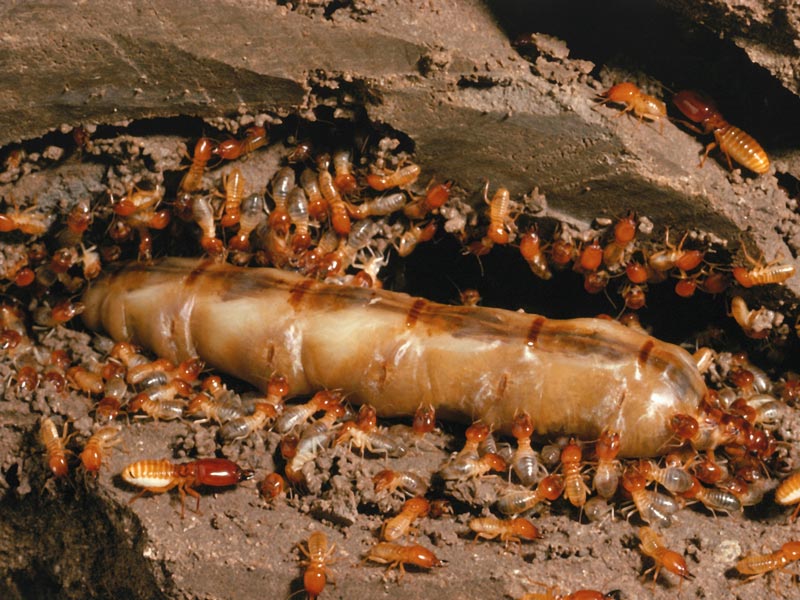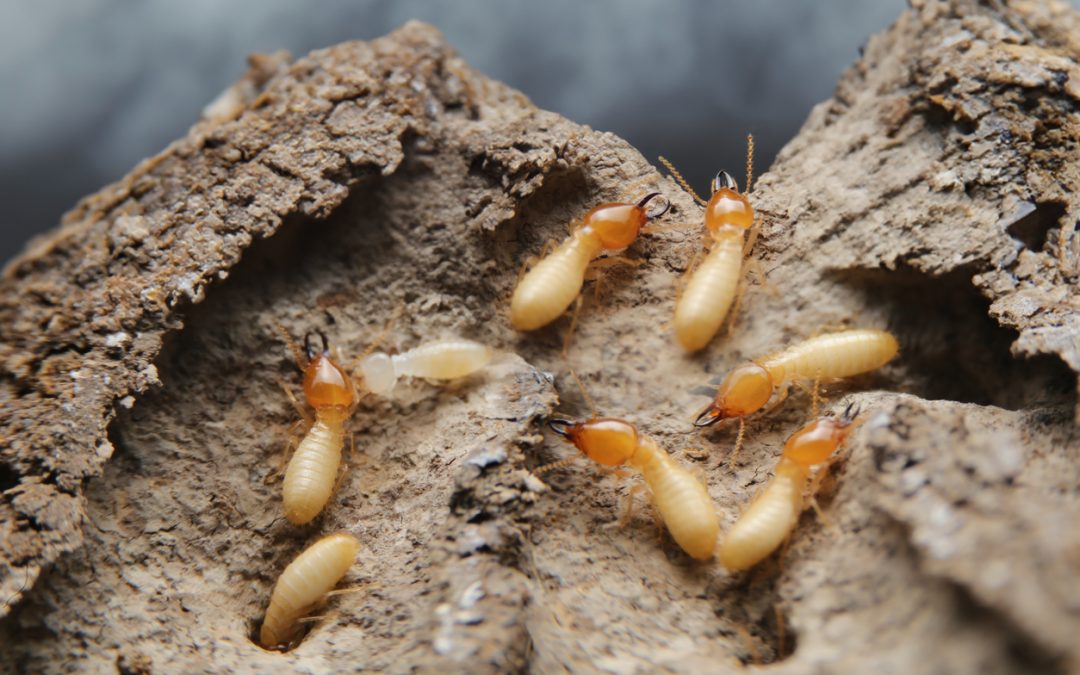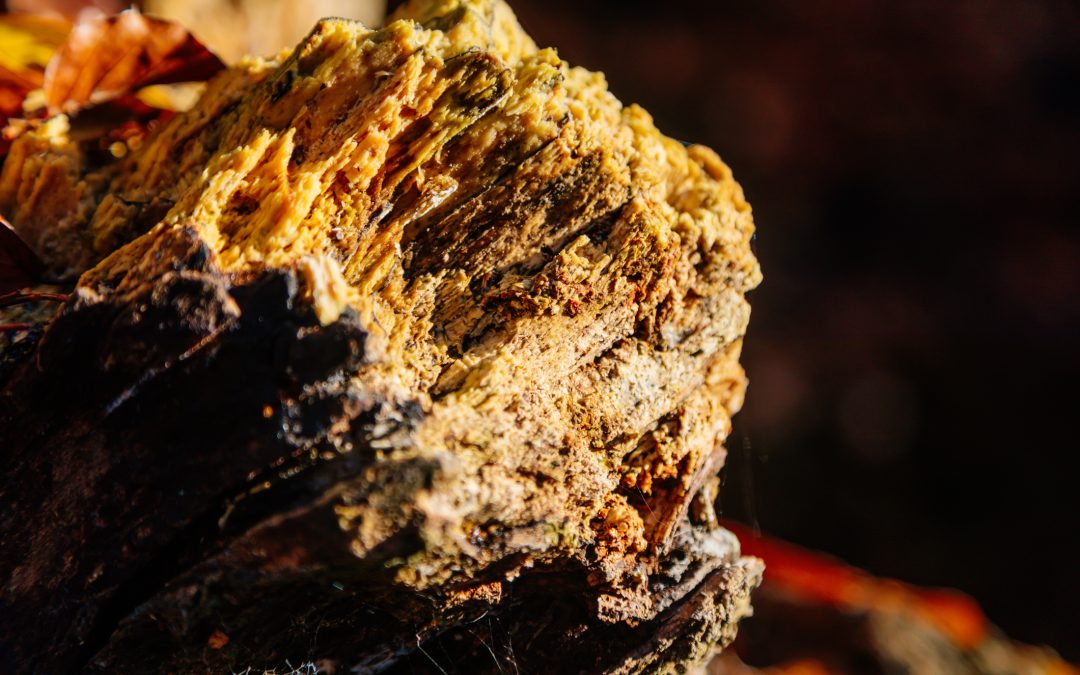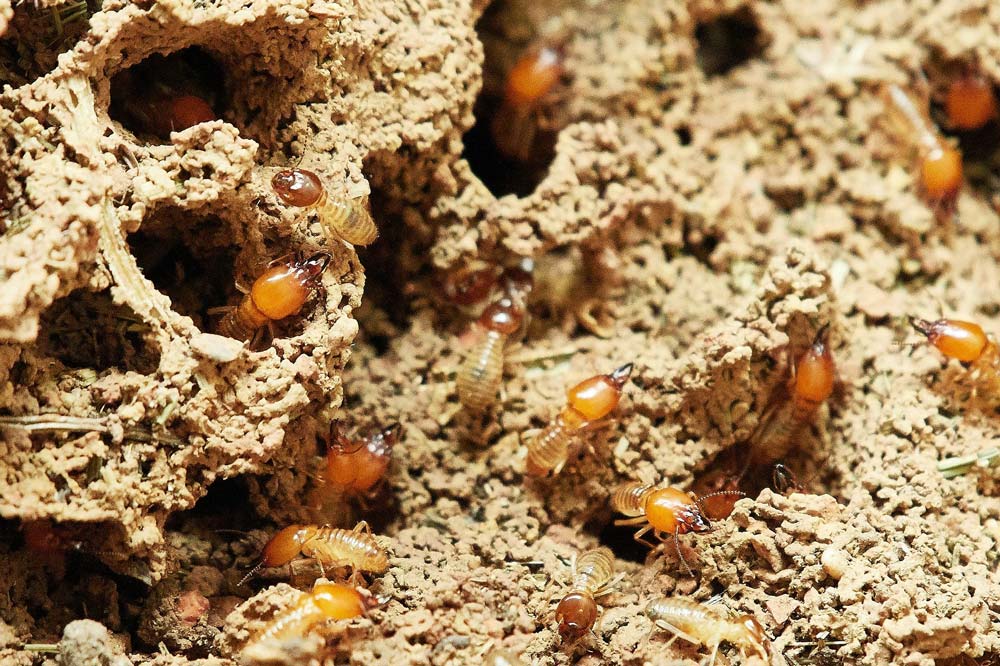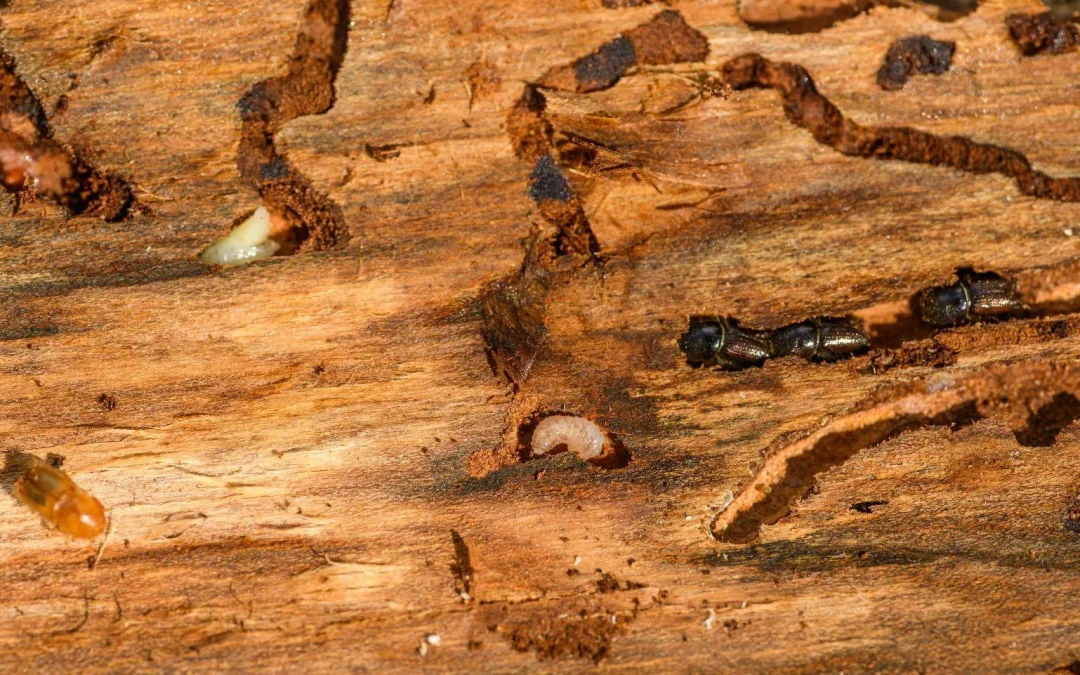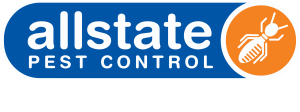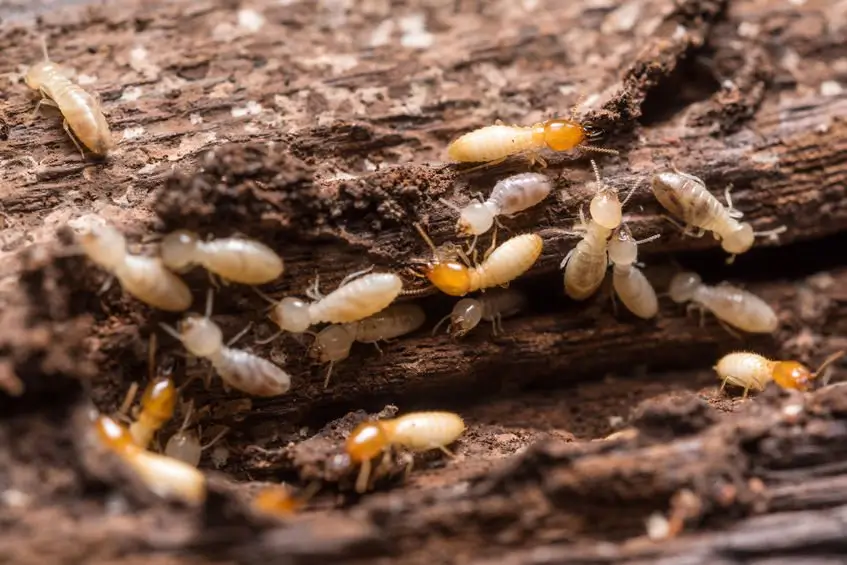
Why Regular Termite Inspection Protects Your Home from Damage
What questions will this article answer?
How often do I need a termite inspection?
Government guidelines recommend that a termite inspection should be carried out at least once a year, depending on your property’s risk of termite activity.
How do you prepare for a termite inspection?
Allowing your termite inspector access to more of your property means that they can provide you with a more thorough assessment. For better access, you can move furniture away from walls, clear away items in wet areas, enable easy access to entry and exit points, and trim overgrown vegetation around the house.
How are termites detected?
A termite inspector will visually inspect your property to check for building damage, mud tubes, and ingress points. We may use specialised equipment such as borescopes, sounding tools, moisture meters and movement detectors. Once we’ve finished, we’ll send you an inspection report with our findings, recommendations and a proposed treatment plan if required.
What happens during a termite inspection?
A fully licensed and experienced termite inspector will use termite detecting equipment to perform a physical inspection of your property. The inspection should include inside rooms, roof voids, outbuildings, on floors and subfloors, around your yard and along the outside walls.
How will I know if I have termites?
You’ll notice damage to walls, floors and ceilings, and a hollow sound when you knock. Your electricity may short circuit often, and there may be flying termite swarms, discarded wings, or mud tubes.
How much does a termite inspection cost?
Our termite inspections start at $198, though the exact price depends on the size of your home, the extent of the inspection and the need for additional equipment.
How do you treat a termite outbreak?
We’ll propose a customised treatment plan using termiticides such as Premise Treated Zones and Sentricon® Always Active™ and make recommendations for general maintenance, which can help prevent future outbreaks.
Will I need a termite inspection if I live in a new home?
Annual inspections are necessary according to government guidelines. Unfortunately, no termite barrier is completely guaranteed to keep termites away, whether your house is new or old. You’re also more at risk of a termite attack if you live in a hot and humid climate, have neighbours with termites, water leaks, previous outbreaks, or recent landscaping changes.
How can you safeguard your home (and wallet!) from a termite attack?
Annual inspections by our fully licensed termite inspectors will keep you and your family safe from an expensive and destructive termite attack. We are available 24/7 for emergency call outs, offer payment plans so everyone can afford to stay protected, and offer a 100% money-back satisfaction guarantee for our services.
Considering that the cost of termite damage in Australia exceeds $1.5 billion each year, a termite inspection is hands down one of the smartest things you can do for your house.
They don’t rattle pots and pans when they arrive. They slip in quietly, chew through your timber. And before you know it, you’re staring at hollow floors or sagging roof beams.
At Allstate Pest Control, we see these all the time; unfortunately, often years after the first invasion, when the damage is already done. We’ve seen homes saved by early inspections, and others ruined when inspections were skipped. That’s why we bang on about it so much.
What is a Termite Inspection?
A termite inspection is a thorough examination of a property to detect signs of termite activity, infestation, or damage. This process visually inspects various parts of the property, including the subfloor, roof void, internal and external areas, and surrounding outdoor spaces.
Conducted by a licensed termite inspector, professional termite inspections utilise specialised equipment such as thermal imaging cameras, moisture metres, and termite detection devices. These tools help identify termite activity and damage that might not be visible to the naked eye, ensuring a comprehensive property assessment. For those in South Australia, our termite inspections in Adelaide services are tailored to address the specific challenges of the region.
Why Termite Inspections Matter
It’s official – termites cost Australian homes more in damage every year than floods, storms, and fires combined. 1 in 3 homes will face a termite attack in their lifetime. It’s not a maybe. It’s a matter of when.
Worse, if you’ve ever spotted termites around or had a home invasion that wasn’t treated well, chances are… they are coming back!
Here’s why regular inspections matter:
- Damage isn’t cheap: We’ve seen repair bills ranging from $10,000 to $100,000. Your insurance usually won’t even touch it.
- Annual checks keep costs down: A few hundred bucks once a year can save a lifetime of headaches and life savings.
- Every home is fair game: Doesn’t matter if you’re in a 1950s weatherboard or a brand-new brick veneer, if there’s timber, termites are interested.
- Stress is avoidable: Catching active termites early makes treatments quicker, cheaper, and far less stressful and costly.
Skipping inspections is like ignoring that rattle in your car engine. Sure, it still runs, but for how long?
Book a termite inspection in Adelaide once a year. It’s cheaper than regret.
How Often Do I Need a Termite Inspection?
According to the AEPMA (Australian Environmental Pest Managers’ Association) Code of Practice for Termite Management, timber pest inspections should be performed at least once a year, depending on your home’s risk level.
Termites are known to cause extensive and costly problems to homes and businesses. It’s estimated that one in five Adelaide homes will fall victim to termite destruction, and the average cost of treating and repairing the damage is around $10,000 (according to the AEPMA).
What’s worse is that termite damage is considered preventable, so it’s not covered by home and contents insurance. Taking precautions against termite infestation is well worth the long-term investment, especially when the cost of an inspection is comparatively low, at around $200.
Don’t leave your annual termite inspection too late!
Make an appointment today
or
Common Signs of Termite Activity
We analyse this regularly – most recently in our post, which talks about the six signs of termite activity. People often miss the early warnings. Termites are sneaky like that. But if you know what to look for, you’ve got a fighting chance.
Keep an eye out for:
- Timber that sounds hollow when tapped.
- Mud tubes or soil tracks along walls or posts.
- Piles of discarded wings near doors and windows.
- Doors and windows that suddenly stick.
- Clicking sounds in the walls (yes, termites can be noisy eaters).
One Adelaide homeowner thought the hollow floorboard in his lounge was “just old timber.” Within months, the entire floor collapsed. It appeared that the culprit was a subterranean termite colony quietly chewing away below. Don’t make that mistake.
What a Termite Inspection Involves
An inspection isn’t a quick look and a shrug. It’s a proper process. Here’s what it includes:
Visual Checks
Inspectors go through every accessible part of the house, walls, floors, roof space, skirting boards, even the garden sheds and pergolas. They’re looking for cracks, damp spots, mud tunnels, and any other signs of termite activity.
Moisture Testing
Moisture is like a welcome mat for termites. Using meters, inspectors pick up damp spots behind walls, under bathrooms, and in kitchens. That’s often where the first signs appear.
Tools of the Trade
Professional termite inspections use gear like:
- Thermal imaging cameras to spot heat changes from colonies.
- Moisture meters to pick up leaks termites love.
- Borescopes to peek inside walls and timber.
For educational purposes, we’ve explained how we conduct a regular termite inspection in this short video.
Types of Termite Inspections
Not all termite inspections are the same. Here’s the rundown.
Pre-Purchase Inspections
Before you sign the dotted line for a new home, get a building and termite inspection. Too many Adelaide buyers skip this and end up with a mortgage plus a termite problem costing tens of thousands of AUD. One family in the Hills bought a weatherboard with capping and still found termites within a year.
Annual Building and Termite Inspection
This is the standard every homeowner should follow. We know a Mawson Lakes family that books theirs every year. Inspectors found mud tubes early, treated them, and saved what could’ve been $20,000 in roof frame repairs. You’ve got two choices: call a roofer for a reroofing quote or a termite service for an inspection.
Termite and Pest Inspection Packages
Why stop at termites? Many combine checks with broader pest control, ants, spiders, rodents, the lot. Landlords especially appreciate these packages for maintaining properties in good condition.
At Allstate Pest Control, our termite inspection and treatment services are set up to cover all bases.
Termite Inspection and Treatment
Finding termites isn’t the end of the world. Doing nothing about it is. Once the termite inspection results are in, treatments are mapped out.
- Baiting systems: Termites take the bait back to the colony and share it.
- Chemical barriers: Applied in soil around the house to block entry.
- Spot treatments: For infestations in walls, floors, or other localised spots.
- Monitoring systems: Regular check-ups to make sure they don’t return.
A professional termite treatment in Adelaide is always tailored. It depends on the species, soil type, and the layout of the house.
Various Termite Species in Adelaide
South Australia has a few troublemakers, but subterranean termites are one of the nastiest types of termites here. They’re silent, fast, and destructive.
Main offenders include:
- Coptotermes acinaciformis: responsible for most of the big structural damage we see.
- Schedorhinotermes intermedius: smaller but aggressive in numbers.
- Nasutitermes exitiosus: not as bad but still a headache for fences, sheds, and decking.
You probably can’t identify them unless you call a termite service. Yet, knowing the species makes all the difference in termite management. That’s why proper ID is step one in every job.
Noticing signs of a potential termite attack? Act fast!
Organise an urgent inspection today
or
How Much Does a Termite Inspection Cost?
At Allstate Pest Control, we offer termite inspections from $198. This figure can vary depending on the size of your home or property, the extent of the inspection and whether additional equipment is required to improve accessibility or detection.
A standard termite inspection typically costs between $200 and $500, while a comprehensive inspection can range from $1,000 to $2,000 or more. However, the cost of a termite inspection is a small price compared to the potential cost of repairing termite damage.
What Factors Affect the Cost of Termite Inspection?
The cost of a termite inspection can vary based on several factors, including:
- Property size and complexity: Larger or more complex properties may require more inspection time and resources.
- Location and accessibility: Hard-to-reach areas or properties in remote locations can affect costs.
- Type of inspection: Standard, comprehensive, or specialised inspections may have different pricing.
- Equipment and technology used: Advanced tools and technology can increase costs but provide more accurate results.
- Inspector’s experience and qualifications: More experienced and qualified inspectors may charge higher fees.
- Frequency of inspections: Regular inspections, such as annual or bi-annual, may offer cost savings compared to one-time inspections.
By following this plan, the new sections will seamlessly integrate into the existing article, providing valuable information while maintaining the same tone and style.
If I Live in a New Home, Will I Need a Termite Inspection?
Whether your home is new or old, pesky and persistent termites can still find their way into your property. Here are some other factors that may influence your susceptibility to an outbreak:
Hot and humid climates
For a significant part of the year, most areas in Australia, including Adelaide, have favourable weather conditions, which pose a high risk for termite infestations.
Neighbours with termites
If adjoining properties have confirmed outbreaks, termites may have also spread to your property, as they’re able to travel 50 to 100 metres away from their nest. If your neighbours have termites, we recommend that you conduct a property inspection just in case.
Water leaks
If you live in a high-moisture, damp climate, or you’ve had a plumbing issue with water leakage, you may have attracted termites. In this case, you may require more frequent inspections.
Previous termite infestation
If there has been a previous outbreak in your area, this could mean that termites were able to penetrate any previous barriers that were installed.
Landscaping
Changes to your yard can compromise your existing termite barrier and offer termites new entry points to your property and home.
Termite inspections before purchasing a home
For extra protection against termites, particularly if you live in a high-risk area, Allstate can conduct pest inspections before you commit to buying your dream home.
We’ll let you know if we detect any termites or if the house has other risk factors that may predispose your new place to a termite outbreak, such as dampness.
For safe and effective termite control,
speak to a termite technician today
or
How to Treat a Termite Outbreak?
Your inspection report will include all the necessary information to help you prevent termites.
Depending on the severity of your outbreak and the layout of your home, we’ll propose a customised treatment plan using various types of termiticides and offer tips on preventing future outbreaks. It is crucial to seek professional termite treatment to ensure the infestation is managed effectively and safely.
Premise Treated Zones
Premise is a non-repellent termiticide that causes termites to become confused and disoriented, lowering their defence mechanisms. This makes them vulnerable to deadly diseases from fungi and soil microorganisms. By placing Premise in specific areas, known as treated zones, strategically around your property, more termites will interact with the product. While Premise is toxic to termites, it is safe for humans, the environment and other wildlife.
Sentricon® Always Active™
This product contains in-ground termiticide-coated rods designed to attract termites and then disrupt their growth and development by inhibiting the moulting process. By positioning a Sentricon® station in prime termite foraging areas, termites carry the termiticide back to the nest, spreading through the entire colony. This offers powerful protection against termite infestations by preventing them from happening in the first place.
Reduce your risk of attracting termites
Garden and yard maintenance is essential. Store piles of wood and timber away from your house in a dry place, remove tree stumps and clear away piles of vegetation and litter.
Ensure wooden furniture in the home is sealed, treated and moisture-free.
Repair sources of leaks as quickly as possible, including pipes, drains and roof damage.
For a reliable and experienced termite inspection service,
contact us today
or
Case Studies: Lessons from Real Homeowners
Here’s what actually happens when people do, or don’t, book pest inspections.
- Saved by annual checks: A homeowner in Adelaide’s east avoided $10,000 in damage thanks to a routine inspection that spotted early mud tubes under a deck. Quick treatment followed and problem solved.
- Caught by fine print: A couple with a 2009 build thought their warranty covered them.
Turns out, termites slipped in between the render and brickwork. They had no inspections. Warranty didn’t apply either. So, they paid the full cost.
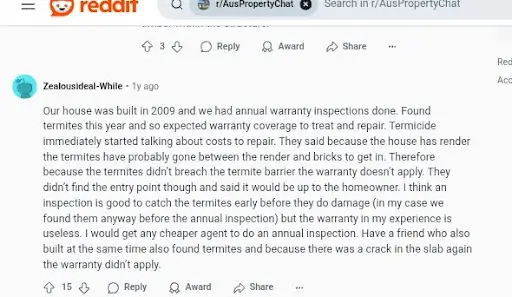
- DIY gone wrong: A new buyer asked online how to inspect their own termite barriers. The best advice they got was to stop mucking around and engage a licensed inspector.
These are real experiences of Adelaide homeowners. And they prove one thing: nothing beats professional termite inspections.
Inspections Cost Far Less than a New Roof or Furniture
Regular termite inspections aren’t overkill. They’re essential. They stop infestations before they spread, protect your home’s value, and save you from unplanned repair bills.
If you’re in Adelaide, do yourself a favour: book a pest control termite inspection once a year.
Call Allstate Pest Control Adelaide for that on 08 8371 1277 or book a termite inspection online now. We’re locals, we’re licensed, and we know how to keep your home safe from termites.
Better to spend a little now than lose a lot on a new roof structure, skirting boards, or furniture later.
Better to spend a little now than lose a lot on a new roof structure, skirting boards, or furniture later.

